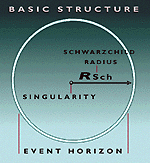Classic black holes are a remnant of Einstein's equations
Nothing can escape from classical black holes
The event horizon always increases
Quantum investigation shows
Black Holes are not totally black.
Stephen Hawking showed that black holes radiate.
Bekenstein noted that black holes obey an "area law", dM = K dA, where 'A' is the area of the event horizon and 'K' is a constant of proportionality
Hawking used a semiclassical calculation to show that the temperature of a black hole is given by T = 4 k [where k is a constant called the "surface gravity"]. Therefore the entropy of a black hole should be written as S = A/4
At the event horizon of a black hole quantum uncertanty indicates that quantum vaccum fluctuations where particles and anti-particles are constantly being produced then destroying one another. Sometimes a partener gets sucked into the black hole leaving the other particle free to ratiate. The black hole has now lost the mass of the particle and as a result the area of the event horizon decreases.
The particle radiated has thermal distribution, so black holes can be treated like thermodynamic bodies.
Thermodynamics from the quantum view is based on the number of quantum microstates of the constituents

Strominger and Vafa have shown that D-brane techniques can be used to count the quantum microstates associated to classical black hole configurations.
The simplest case, which was studied first, is static extremal charged black holes in five dimensions.
Strominger and Vafa showed that for large values of the charges the entropy (defined by S = log N, where N is the number of quantum states that system can be in) agrees with the Bekenstein-Hawking prediction (1/4 the area of the event horizon).[8][9]
Nothing can escape from classical black holes
The event horizon always increases
Quantum investigation shows

Black Holes are not totally black.
Stephen Hawking showed that black holes radiate.
Bekenstein noted that black holes obey an "area law", dM = K dA, where 'A' is the area of the event horizon and 'K' is a constant of proportionality
Hawking used a semiclassical calculation to show that the temperature of a black hole is given by T = 4 k [where k is a constant called the "surface gravity"]. Therefore the entropy of a black hole should be written as S = A/4
At the event horizon of a black hole quantum uncertanty indicates that quantum vaccum fluctuations where particles and anti-particles are constantly being produced then destroying one another. Sometimes a partener gets sucked into the black hole leaving the other particle free to ratiate. The black hole has now lost the mass of the particle and as a result the area of the event horizon decreases.
The particle radiated has thermal distribution, so black holes can be treated like thermodynamic bodies.
Thermodynamics from the quantum view is based on the number of quantum microstates of the constituents

Strominger and Vafa have shown that D-brane techniques can be used to count the quantum microstates associated to classical black hole configurations.
The simplest case, which was studied first, is static extremal charged black holes in five dimensions.
Strominger and Vafa showed that for large values of the charges the entropy (defined by S = log N, where N is the number of quantum states that system can be in) agrees with the Bekenstein-Hawking prediction (1/4 the area of the event horizon).[8][9]